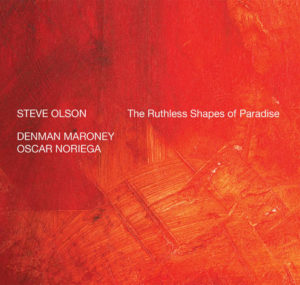 “When I arrived at Morton Feldman’s music, I felt as though I’d found home. Even though he composed most of his works in the noise and chaos of New York City, it immediately reminded me of growing up in a small town in Iowa, and the endless space of the Kansas Plains, where I lived for seven years. His use of space and time move me.”
“When I arrived at Morton Feldman’s music, I felt as though I’d found home. Even though he composed most of his works in the noise and chaos of New York City, it immediately reminded me of growing up in a small town in Iowa, and the endless space of the Kansas Plains, where I lived for seven years. His use of space and time move me.”
That paragraph is in the liner notes of Baltimore area drummer Steve Olson’s latest release — featuring Denman Maroney on hyperpiano and Oscar Noriega on alto saxophone and bass clarinet. The album is a stark departure from his previous effort, “Conversations.” On that set, Olson brought in a plethora of instrumentalists to speak the language of music to one another, essentially all adding up to 15 tracks of sheer fascination (“Drop The Sticks!” is still something you ought to pull out of the closet every now and then).
This time? The game has changed — the lineup is consistent and the ideas even weirder. That’s what you get when a sentence like “Feldman began to write pieces that had no relation to compositional systems” can describe the project’s main inspiration. Don’t just expect space. Don’t just expect sounds. Expect a series of instrumentals that make almost no sense to the common ear all the while adhering to a desire to utterly ignore any sniff of structure.
Check out the rambling opener “Rothko” (which may or may not be an ode to Feldman’s “Rothko Chapel”). At nearly 13 minutes, the performance works as adequate background music, or, perhaps more specifically, the soundtrack to a Godard film (the most probable of which would be “Breathless”). A ride cymbals pitters and patters occasionally as faint tom-toms pound with subdued force and rim shots echo through the studio. Noriega’s horn work sustains itself in and out of the spotlight, adding a wide array of moods, ranging from somber to impatient.
Actually, speaking of impatient, “Skittering” utilizes Maroney’s hyperpiano in delicate and hushed ways. Part of what makes these tracks so interesting is the idea that these musicians sat with one another and performed these things live. Together. At once. It’s interesting because of how fragile everything seems to be. Noriega’s horn is at once ignored and celebrated, a backdrop and a center stage. Sure, you can argue that he takes what feels like the lead here, but there’s no way it would work without the ambience that props it up.
Other moments turn the abstract to 11. “Crunchy Grumbles” is an aggressive trip through an unstable mind. If there’s anything that can be labeled uptempo in such a world, this might be the answer. “Give My Regards To Eighth Street” feels like a rainy day, with the sporadic piano turning from melancholic to suggestive at the drop of a dime. You can almost envision the drops falling from the sky, into a puddle on West 54th Street. Closer “Monastery” is probably the most sustaining track of the bunch. When Noriega doesn’t want to let go of a note … well, he doesn’t let go of a note.
Which might be why the set’s best moment, “Rest In Peace Ornette,” is a beautifully persistent send off to the saxophone icon who died earlier this year. It eases in with suspense (and, of course, sustainability) only to give way pure elegance in the form of Noriega’s alto playing. Sure, Olson and Maroney sit back for the most part, but that’s precisely what they should do in a nearly-11-minute opus presumably performed to pay respect. The runs that Noriega slips in between sustaining notes are a joy to reveal, if only because it finally seems like someone in the trio wants to kick off his shoes. The drummer inevitably follows suit with busy scatting that fades somewhere behind the background. It might not be an easy listen, but it sure captures your attention.
And that appears to be the point of “The Ruthless Shapes Of Paradise.” Those looking for rhythm or groove need not apply. Just like “Conversations” before it, this is a record that isn’t trying to be accessible and it succeeds in every way possible. Whereas Steve Olson’s previous effort provided more intrigue and joy, these performances pay tribute to a man who never sought celebration. To the unseasoned listener, it’s just a series of sounds, but to these three players, it’s an explosion of improvisational imagination, for better or for worse.
Either way, though, Morton Feldman ought to be proud.
* 2 1/2 STARS OUT OF 4 **
